Michaela Goldhaber: What was the basic idea in founding Wry Crips?
Patty Overland: We had seen Mothertongue Feminist Theater Collective in the community. Then we had seen Fat Lip Reader’s Theater and how it had empowered fat women, and we thought they would be good models for a theatre group for disabled women.
Michaela: What year was this?
Patty: The summer of 1986.
Judith Smith: We were having a meeting around organizing accessibility for gay pride, and Patty started talking about creating a performance group.
Patty: I wanted to get groups of disabled women who wanted to write about disability together, to talk about their disability. I remember having a gathering of eight to ten women at Judy’s house.
Laura Rifkin: We started with a blank canvas. There were other types of affinity groups that were doing reader’s theatre (script-in-hand public performances), but disabled people—disabled lesbians, disabled women—coming together and figuring out how to work through obstacles was revolutionary.
Judith: We didn’t have any role models. There weren’t other people we could go to and say, “How do we do this?”
Laura: Everybody felt: “This is so important.” We were determined to make it happen.
Judith: There was a lot of personal investment and there was also the political and social relevancy. More was at stake than just: “We’re going to do this thing that will entertain people.”
Michaela: Were you all writing at the time?
Judith: I was not, and, ultimately, I felt I didn’t have very much to contribute to Wry Crips because I wasn’t comfortable writing about my life and I wasn’t really comfortable speaking. It’s funny because, as artistic director of AXIS, that’s what I’ve spent the last thirty years doing until recently. I was involved in the initial Wry Crips meetings and I hosted them because I had a large accessible space in my house.
Michaela: Would you say that the Wry Crips meetings in which you participated helped lead to the creation of AXIS?
Judith: No, I think Wry Crips and AXIS Dance Company were very separate, though similar timeframe. AXIS started in 1987. It was a politically rich time here in the Bay Area for people with disabilities and for the independent living movement and the disability equity movement. It’s not surprising that everything was popping up at about that time.
Laura: Also for the lesbian movement.
Judith: Yeah. Patty, Laura, and I were all involved in that.
Peni Hall: I was not one of the three founders, but I did go to meetings as soon as I knew about it, and I was in the first performance. There was conversation about whether this was going to be a lesbian group or a mixed group, and the ultimate decision was that it was going to be a mixed women’s group. There were mostly lesbians involved, at least at first, but we always had—
Patty: A few straight people. There weren’t any other opportunities for disabled women to perform so it wasn’t right for us to discriminate.
Peni: One of the straight women was playwright and poet Cheryl Wade, who directed our second program. She was a dynamo and just wonderful. We also had a fundamentalist Christian and some lesbian separatists.
Patty: We passed out flyers everywhere we went to invite disabled women to our meetings. The flyer said, “No experience necessary in writing or acting,” which is a way that we’ve continued to tap into people’s potential.
Disabled people—disabled lesbians, disabled women—coming together and figuring out how to work through obstacles was revolutionary.
Michaela: Had you done any performing before you started the group?
Patty: I had been writing poetry since I was sixteen years old. Just for myself, I wasn’t trying to get published, but I’ve been published a couple of times since. But I hadn’t performed.
Laura: I’d been writing.
Peni: I had a background in performance, but not much experience writing. My first thought was, Who wants to hear what I have to say? And then I remember that Diane Hugs, another early member of Wry Crips, started telling the rest of us, “What I have to say is worth hearing.” That encouraged me to start writing and performing. Diane came up with the name Wry Crips.
Patty: She just said it: wry, like a wry sense of humor, and crips, short for cripple, and it stuck. In the community there’s still a whole thing about whether disabled people want to call ourselves crips. Some say it’s negative, but I think it’s powerful.
Peni: Our first performance was called Hors D’oeuvres. We called it Crips on Ritz among ourselves.
Michaela: Why is it important to have a place for women with disabilities to write and perform?
Judith: For the same reasons it’s important for any group that self-identifies as something to have a place to be creative. It wasn’t like we were able to just join any other thing that was happening, and that’s true still for people with disabilities. It’s not easy to just show up at an acting class or a movement class or a writing class. I think it was important to start it for ourselves, with ourselves, by ourselves.
Laura: We also had things to say. We were representing disabled women’s point of view. We were living in a world, in a culture, where everything was the opposite of that, and we were bringing ourselves to the table.
Judith: We also did a lot of educating each other. We learned about each other’s disabilities. We learned about the problems we all faced in different ways in the world and how we were seen and treated, and there was a great commonality. I don’t think we would have ever gotten that as the token disabled person in an able-bodied group. In those situations, I feel like saying, “Get out of the way, give me some space, and let me talk!”
Patty: We had women with lots of different disabilities. One thing that is still an issue for us is creating access for Deaf women. ASL interpreters are expensive and we could never afford them on an ongoing basis.
Peni: We had ASL interpreters for our main stage shows, and we paid for the whole thing out of our own pockets. We fronted money to buy stuff and then whatever money we got, we could pay ourselves off and then try to save some money. We were never funded by anybody.
Michaela: I’m working on that. I just got us a grant from Theatre Bay Area’s CA$H program.
Peni: We took on lots of access issues I’ve never seen anybody else address. We had scent-free soap that we put in the bathrooms, and our first few shows became infamous because we had a “sniffer.” The sniffer would actually smell audience members as they were arriving and say, “You have perfume on. There are people here with environmental sensitivities. The bathrooms are down there, would you please go wash it off?” Some people resented it and others said, “Thank heavens you do that.” We had a hearing-impaired section. We had a section for people who couldn’t be around dogs and a section for people who had to bring their service dogs. Our first performance was at the Women’s Building in San Francisco. It was a terrible rainstorm. I thought, I’m never going to get there, nobody’s going to show up. And it was packed.
Laura: People really came out. It was such a supportive community, primarily lesbian.
Judith: It was also such a rich time for gay and lesbian culture, and we went to our own things and supported our own musicians, performers, comedians, and strippers. We didn’t feel we could just go to everything, be out and be comfortable, we wanted our own space.
Peni: Barbara Ruth, another longtime member, did a piece where she told the audience: “Some of you are disabled and you don’t know it yet.”
Judith: The work that everyone put in to make sure every voice was heard, even if a person didn’t speak as clearly or as quickly, was part of the access.
In the beginning we named our shows Hors D’oeuvres, Just Desserts, and Second Helpings—all food images. We were offering ourselves up to the audience as delicious treats.
Peni: When we were doing No Apologies, a woman named Sacha Bittner was one of the performers in the show, and she is very speech disabled. I don’t know if that’s the right way to say it but understanding her is really hard. We got someone to be her voice interpreter who worked with her and worked with us and went to rehearsals and performed with us.
Patty: My friend Leslie Gordon had to be interpreted. People would just wait for the interpreter to say something, but Leslie wanted to give the performance. People could see the effort that went into it. It’s a powerful experience, you really feel you’re part of something.
Peni: We had one performance where there was a woman who couldn’t get out of bed, so we had her picture on stage and hooked up a mic to a speakerphone. She was lying in her bed at home and the audience heard her voice on stage.
Patty: We brought in young people, and young women of color.
Michaela: Who directed the first production?
Peni: Nobody did the first one.
Laura: In the beginning the group did not want a director. There was tension around that because the group wanted everything to be—
Judith: Collective.
Laura: There was a lot of tension in the first year around who was leading, who was facilitating, who was in charge, whether we could have a director. I remember Diane Hugs being strong about this, that she wanted a director-less group. It became very challenging.
Judith: Because collectives are challenging, and people have to be really, really on the same page, and it’s hard to get to that page.
Laura: I was sort of helping lead at that point when we did the first performance. I remember doing a lot of work to try to pull it together. We had meetings where we sat around and talked about decision-making—it wasn’t just organizing a performance, we were trying to figure out how to run the group.
Peni: We gave each other spiels about what we did in Wry Crips that was important to us, what we were looking for in new people. We were always looking for new people because it was difficult to get performers to commit for the long-term for so little money. We talked about who we were, what we had done so far, and what we were hoping to do.
Patty: In the beginning we named our shows Hors D’oeuvres, Just Desserts, and Second Helpings—all food images. We were offering ourselves up to the audience as delicious treats. Later on we came up with more overtly political shows: we were part of a Miss Normal Pageant in 1988 and No Apologies in 1990.
Laura: We were all part of a project called Fabled Asp in 2010 where we documented forty years of disabled lesbian history in the Bay Area. We had a panel about Wry Crips, which we presented at the San Francisco Public Library. There are lots of photos on our website.
Michaela: After that first performance at the Women’s Building, how did you decide what was going to happen next with Wry Crips?
Peni: We fought.
Laura: That’s how things get done.
Patty: There were the fights about who was middle-class and who was working-class.
Laura: And we fought about leadership in order to have a director.
Peni: We didn’t always succeed, but we tried very hard to talk about things in a constructive manner and to settle things in a constructive manner.
Laura: There was a lot of love in spite of all the fighting.
Judith: There was a lot of respect for each other.
Michaela: What kind of content did your work cover?
Patty: Exploring our sexuality was always a really important part of our work. Able-bodied people tend to think of disabled people as sexless. A lot of our writing was about sex. In 2002, we were banned from a festival here in Berkeley for some of our salacious material. There was a piece I wrote that the festival’s organizers thought was too sexual. We found a place in San Francisco, Noh Space, in the Outer Mission, and we performed it and called it Banned in Berkeley. It was interesting because we had several women, not lesbians, who were performing in a sketch called Lesbian Revolution Forever More.
After that show, all the members of the group drifted apart. We hadn’t done anything in almost ten years. Then a director named Iris Criter and I decided we wanted to work on something. We assembled a new group of writers/performers and created the show We Are Fearless in 2011. There are videos on YouTube from that.
We need disabled people in leadership positions throughout our society, in every profession, and we don’t have that now.
Michaela: Patty and I met in 2015 at an event for the twenty-fifth anniversary of the Americans with Disabilities Act. Vicki Lewis, a scholar of disability and theatre, made a match when she said, “Patty, this is Michaela, she’s a director.” Patty’s eyes lit up, and she handed me her card. I was excited to find out that Wry Crips existed, because I had taken classes with AXIS, and dancing with other people with disabilities made me want to make theatre like that.
Patty and I started meeting and talking about the project that she had been working on with a couple of women who had had to bow out for health reasons, Iretonia, A Sci-Fi Fantasy. I helped Patty to recruit new members and got us a residency with TheatreFirst at the Live Oak Theatre in Berkeley.
Patty: Now we’re working on Wry Crips Occupy. We’re trying to get history across—not necessarily with a focus on entertaining people, but we want to keep them engaged. It’s difficult, but we keep working at it and I think something good is going to come out of it.
Laura: In our earliest performances, we weren’t trying to entertain, but the performances were entertaining. There was a lot of humor. It was tightly woven, it was moving, it was poignant. We had camaraderie and we quickly figured out how to tell a story in a way that was engaging for people. The audience was right in there, in on the joke.
Peni: We were in the right place at the right time to do something like that. Everyone was telling their own personal stories. I would imagine that it is harder to write about a historical event like the takeover of the federal building.
Michaela: We’ve been interviewing people, and now all the members of the group are writing towards a common story. I describe our style as “a collage of spoken-word poetry that tells a story about women with disabilities.” What are your dreams for performers with disabilities?
Judith: A lot of the entry points to the performing arts still don’t exist for people with disabilities. There are programs here and there, but I want there to be access for people who want to show up at a dance class or theatre class or art class or writing class, for them to be able to pursue training and pursue rigor in the same way non-disabled people can. It’s called equity.
Laura: At the same time, there’s still a need for a disabled voice. It’s something that happens when most of the people in a group have a disability. It can be so powerful when you are creating work together out of common experiences. Even if you have one or two disabled people in a performance troupe that’s not specifically for disabled people, it still operates from an able-bodied assumption. Ricky Boden, the founder of the first disabled lesbian support group at Operation Concern in San Francisco and one of the mothers of the movement, used to talk about the “disabled assumption,” and that was what gave us all this freedom.
Judith: The other important thing is that there has to be disability leadership—not only artistic, but also administrative. We need disabled people in leadership positions throughout our society, in every profession, and we don’t have that now. If we start to see more of that then the disabled voice is going to be heard differently.
Michaela: One thing I’ve been doing is reaching out to other theatre companies for people with disabilities around the country, and I’m now connected with Regan Linton, the artistic director of Phamaly Theatre in Denver, and Gregg Mozgala of the Apothaetae in New York, just to know each other and share work and thoughts.
Laura: I think it’s wonderful that you are having another iteration of Wry Crips. It was dormant, and Patty really decided to pick it up again and brought you in, which is leading to new directions, and new people.
Judith: We probably should have had this conversation twenty years ago so we’d have some recollection.
Laura: That’s okay, we’re still here.

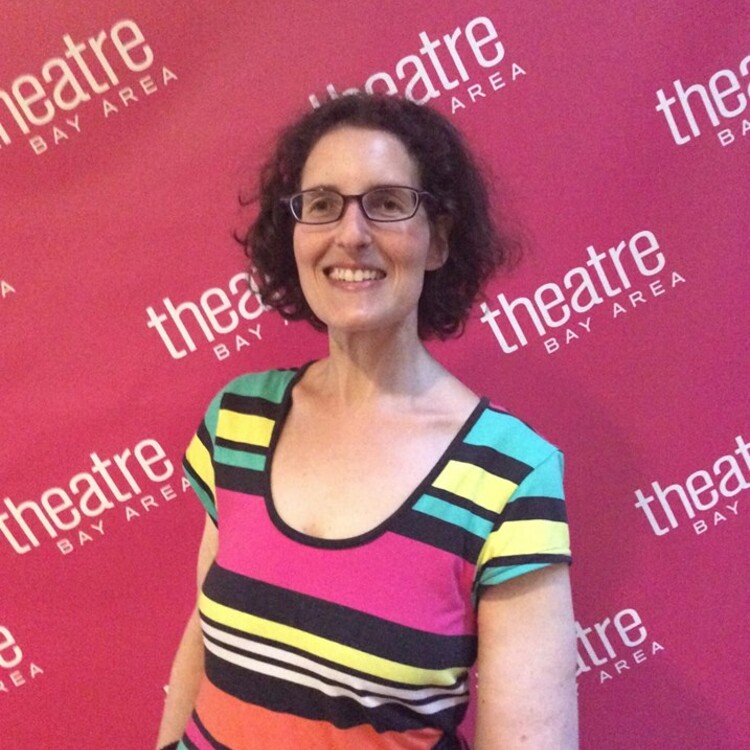
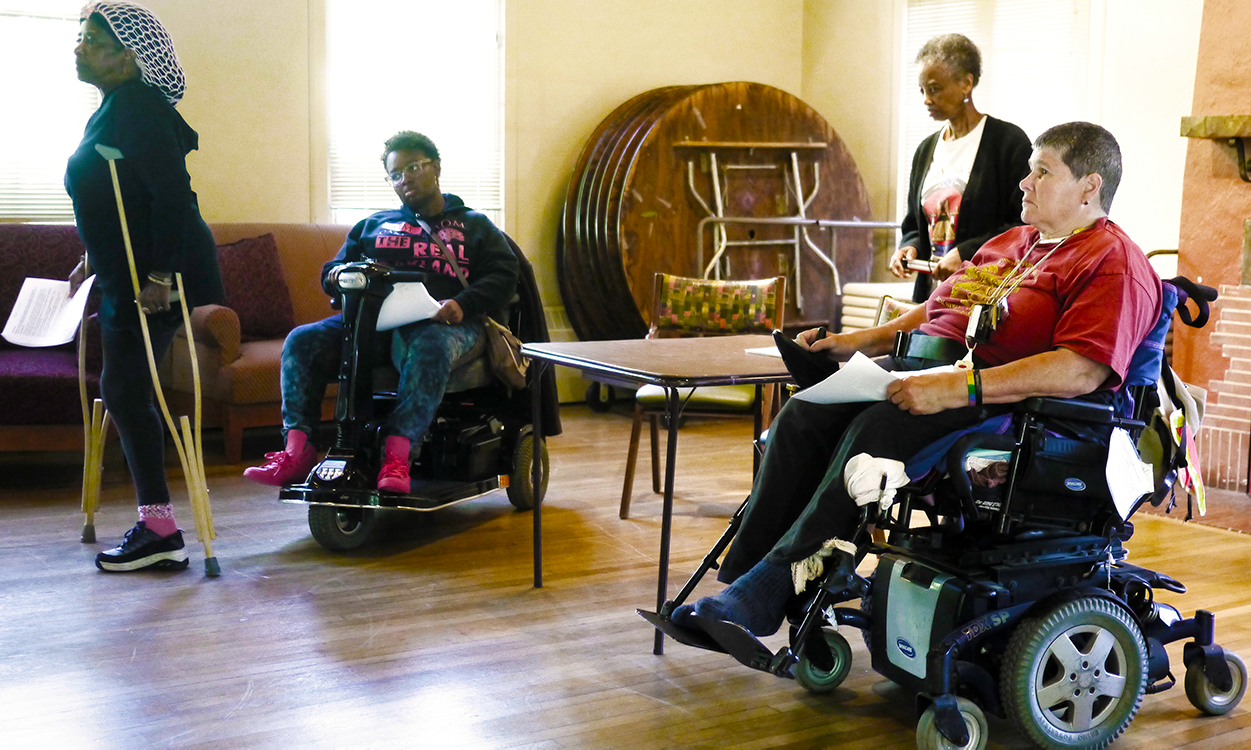
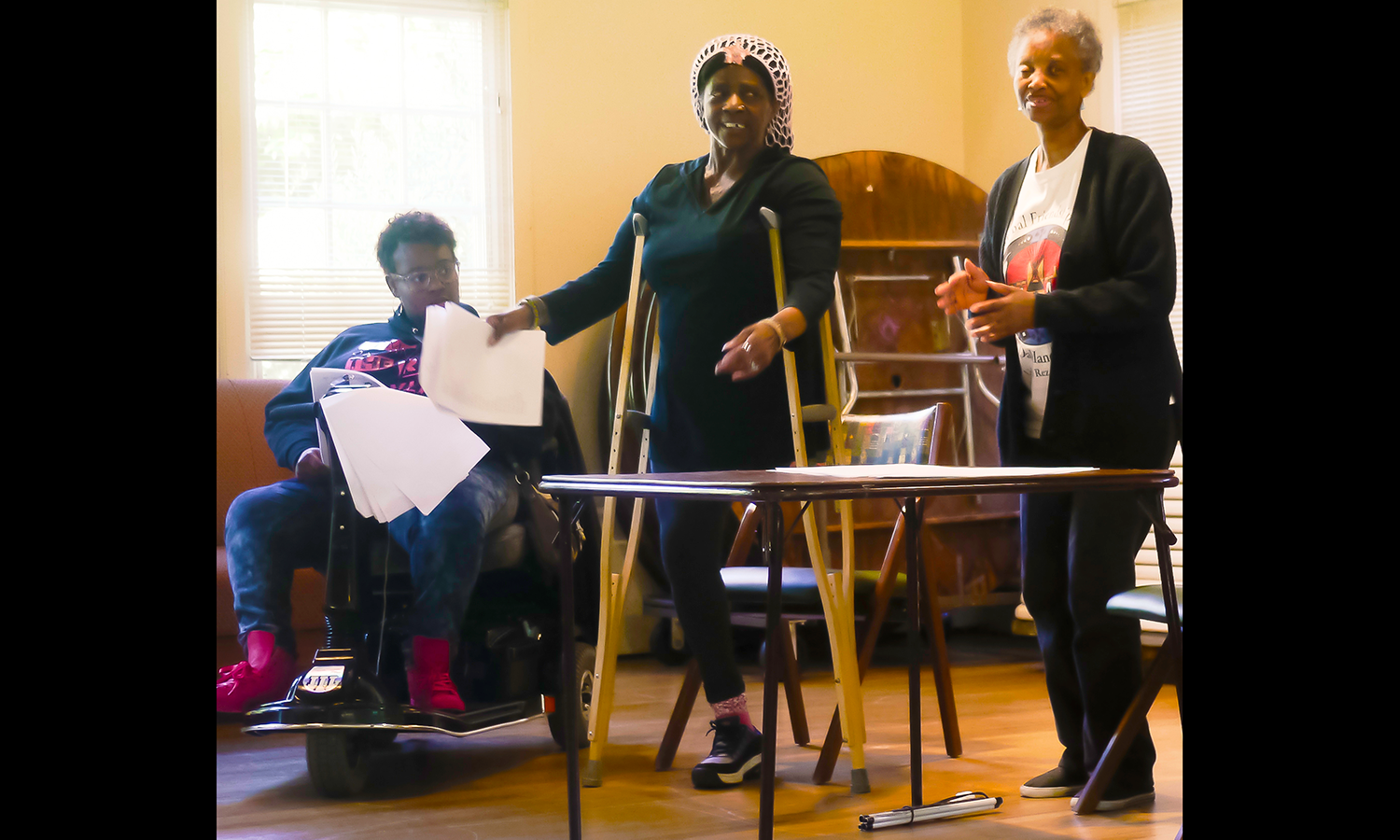
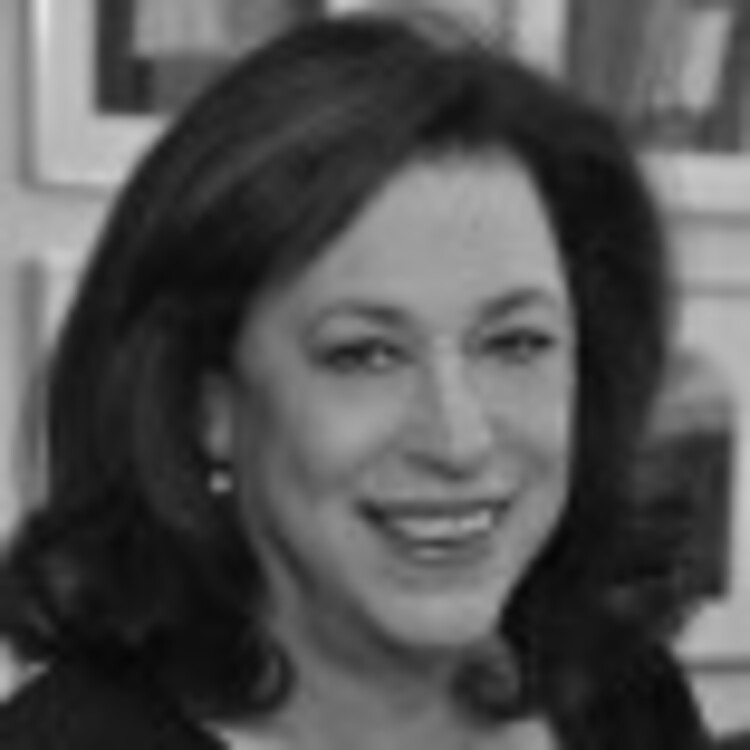
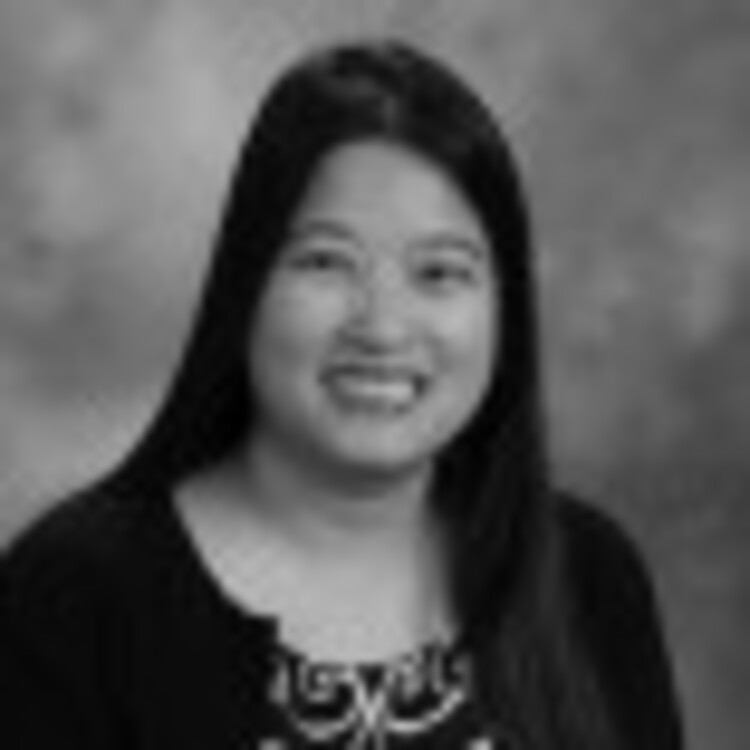
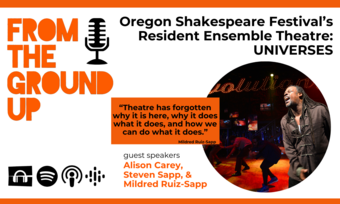




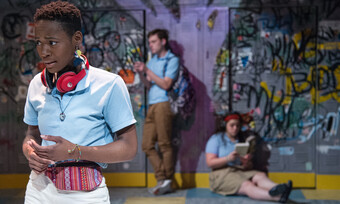


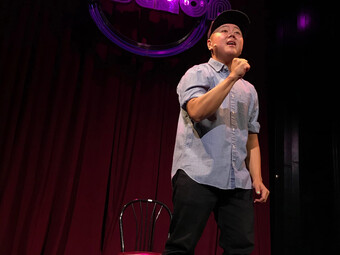


Comments
The article is just the start of the conversation—we want to know what you think about this subject, too! HowlRound is a space for knowledge-sharing, and we welcome spirited, thoughtful, and on-topic dialogue. Find our full comments policy here